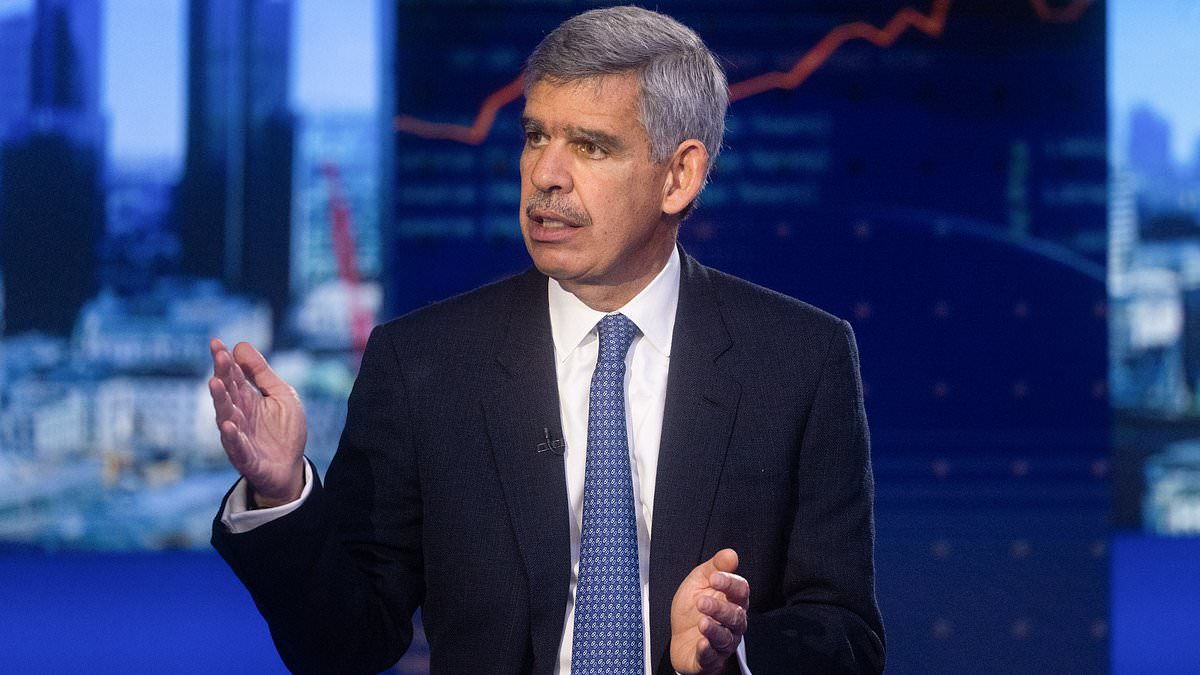A leading economist has issued a dire warning about the US economy – tearing into the Federal Reserve for a ‘policy blunder’ that could send the country into recession.
Mohamed El-Erian, the chief economic advisor at Allianz, said on Sunday he fears the economy may be spiraling following a dismal unemployment report last week.
He places the blame on the Fed for keeping its main interest rate at a two-decade high since 2022 in its zeal to stifle inflation.
Those hikes are now hitting the economy hard, he said, suggesting the Fed should have lowered rates earlier.
‘I really do worry that we may lose US economic exceptionalism because of a policy mistake,’ he told Bloomberg TV, as worldwide markets continued to plummet.

Mohamed El-Erian, the chief economic advisor at Allianz, said on Sunday that he fears for the first time in years that the economy may be heading into a recession
Following the jobs report, which showed unemployment in July rose to the highest level since October 2021, markets worldwide went into a tailspin amid fears that the US economy is sputtering.
A nearly 19 percent decline in Intel’s shares in aftermarket trading deepened the gloom.
Economists at Goldman Sachs have since raised the likelihood of the US slipping into a recession within the next year from 15 percent to 25 percent, while analysts at JP Morgan put the chances of a recession at 50 percent.
To help save the economy, experts say the Federal Reserve must cut interest rates much more quickly than planned to avoid a huge recession.
A rate cut would make it easier for U.S. households and companies to borrow money and boost the economy, but it could take months to a year for the full effects to filter through.

US Federal Reserve Chair Jerome Powell has kept benchmark borrowing costs unchanged at a 23-year high at its latest meeting

Job growth in the US badly missed expectations in July and the unemployment rate jumped to the highest rate in almost three years
The Goldman Sachs analysts said they expect the Fed will cut rates by 25 basis points, but noted that if the August employment report is as weak as July’s was, they could opt for a larger cut.
JP Morgan analysts, though, wrote in a memo that because ‘the Fed looks to be materially behind the curve, we expect a 50 [basis point] cut at the September meeting, followed by another 50 [basis point] cut in November.’
Yet the Fed left benchmark borrowing costs unchanged at a 23-year high at its latest meeting last week.
The market is now ‘wondering if the Fed is too late in transitioning monetary policy,’ Quincy Krosby, chief global strategist at LPL Financial told CNBC.

Worldwide stocks plummeted following the jobs report on Friday

As the markets opened in Asia and early Monday, NASDAQ futures dropped 2.27 percent
As the markets opened in Asia and early Monday, NASDAQ futures dropped 2.27 percent, while S&P 500 futures dropped 1.41 percent.
The situation was not much better internationally, with EUROSTOXX 50 futures down 0.6 percent, and Japan’s Nikkei shedding a staggering 5.5 percent to hit a seven-month low – marking its biggest three-session loss since 2011.
The losses followed the trend that began on Friday, when Japan’s market retreated to where it was trading in January before it surged to an all-time high last month of 42,000.
Elsewhere in Asia on Friday, Hang Seng in Hong Kong dropped 2.1 percent to 16,945.51, while the Shanghai Composite index saw a more modest loss, of 0.9 percent to 2,905.34.
Chinese shares have extended losses as investors registered disappointment with the government’s latest efforts to spur growth through various piecemeal measures, instead of hoped-for infusions of broader stimulus.
The Kospi in Seoul dropped 3.7 percent to 2,676.19 and Taiwan’s Taiex sank 4.4 percent. Both markets tend to be hit hard by weakness in technology shares.

Many investors are now wondering if the Fed waited too long to cut rates
Meanwhile, ‘s S&P/ASX gave up 2.1 percent to 7,943.20 and the Sensex in India was down 1.1 percent. Bangkok’s SET fell 0.7 percent.
Japanese shares also suffered after the central bank raised its benchmark interest rate on Wednesday, to 0.25 percent from 0.1 percent.
That pushed the value of the Japanese yen higher against the US dollar, potentially hurting overseas earnings of major manufacturers and deflating a boom in tourism.
Investors now believe that other major central banks will follow the Fed’s lead and ease rates more aggressively, with the European Central Bank believed to be cutting rates by 67 basis points by Christmas.
